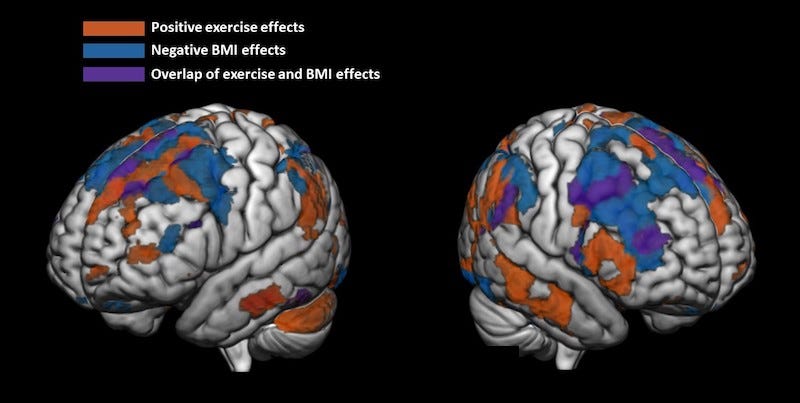Quick Hits
Daily brief research updates from the cognitive sciences

Ok, we all know by now that exercise is good for you. Many of you may also be more than aware that exercise is a potent stimulator for the brain encouraging brain growth and effective functioning. Read my article on brain health here.
Two pieces of research have recently been published which show, however, that not just exercise is good for you, but the timing is essential. Specifically, that exercise in pre-teens predicted the fitness of their brains later and also, by another piece of research, that exercise in childhood predicted healthy adult brains!
So, first off, the study from Boston Children’s Hospital shows that physical activity helps to organise developing brains. This study analysed brain imaging data from almost 6’000 9- to 10-year-olds and found that physical activity was associated with brains that were:
- More efficiently organised
- More robust
- Had more flexible networks
Basically giving kids fitter brains all round and better able to adapt to whatever challenges and cognitive functions come at them. Of note is that it didn’t matter what kind of activity — any physical activity is good.

This then leads us to separate recent study, nicely linking to the above, which looked at childhood pre-teen exercise and cognitive function in later life mapped to MRI data (214 participants aged between 26 and 69). This was conducted by a research group with Professor MATSUDA Tetsuya of Tamagawa University’s Brain Science Institute and Assistant Professor ISHIHARA Toru from Kobe University’s Graduate School of Human Development and Environment.
The results showed that
- People who are physically active during childhood (up to 12 years of age) have higher cognitive functions in later life.
- The positive association between childhood exercise and cognitive function could be seen in the modular segregation of brain networks, strengthened inter-hemispheric connectivity, greater cortical thickness, lower levels of dendritic arborisation and decreased density.
During early childhood the brain is at its most plastic and it seems that exercise optimises the networks and structures that are later used for multiple cognitive functions.
That’s good news, or maybe bad news. Bad news because they couldn’t find an association with cognitive functions and post-childhood physical activity. This is a surprise because there is a lot of research on the positive benefits of exercise — but it could be that these changes are only mild compared to the impacts on a developing child brain which set it up for life.
Got kids? Well, get them exercising!

Andy Habermacher
Andy is author of leading brains Review, Neuroleadership, and multiple other books. He has been intensively involved in writing and research into neuroleadership and is considered one of Europe’s leading experts. He is also a well-known public speaker speaking on the brain and human behaviour.
Andy is also a masters athlete (middle distance running) and competes regularly at international competitions (and holds a few national records in his age category).
Reference
More Quick Hits
Don’t Try to Change Minds – Change Behaviour
Don’t try to change minds, but simply change behaviour is the result a group of researchers have come to with regard to vaccinations.
Why Heat Makes Us Sleepy
Imagine if you are working and your stress levels are increasing, and then automatically soothing music is turned on to calm you down. Or alternatively if you are heading towards that after lunch dip of drowsiness and upbeat energetic music is turned on to energise you.
Tracking Mental States Through Your Skin – In Real Time
Imagine if you are working and your stress levels are increasing, and then automatically soothing music is turned on to calm you down. Or alternatively if you are heading towards that after lunch dip of drowsiness and upbeat energetic music is turned on to energise you.
Testosterone Promotes Cuddling
Quick HitsDaily brief research updates from the cognitive sciences es, you read the headline correctly. Testosterone considered the ultimate male hormone and often associated with aggression has had a bad rap. So, is all of this wrong? Well, the...
Online Learning Triggers Different Stress Responses
Quick HitsDaily brief research updates from the cognitive sciences ot so long ago all learning went online – out of necessity. There has been plenty pf research into differences in online learning and in-person learning but this study by Gellisch...
Use It Or Lose It – Mental Activity Reduces Dementia
Quick HitsDaily brief research updates from the cognitive sciences regularly write on which activities reduce risks of cognitive decline (just last week I reported on how your job can protect your mental abilites with age and also doing household...






